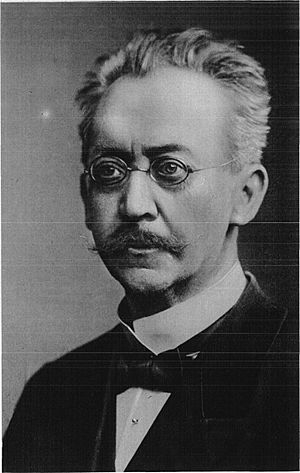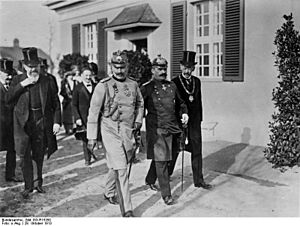Adolf von Harnack facts for kids
Quick facts for kids
Adolf von Harnack
|
|
|---|---|
 |
|
| Born |
Carl Gustav Adolf Harnack
7 May [O.S. 25 April] 1851 Dorpat, Kreis Dorpat, Governorate of Livonia, Russian Empire
(present-day Tartu, Tartu County, Estonia) |
| Died | 10 June 1930 (aged 79) Heidelberg, Republic of Baden, Weimar Republic
|
| Other names | Adolf Harnack |
| Education |
|
|
Notable work
|
|
| Spouse(s) | Amalie Thiersch (1858–1937) |
| Institutions |
|
| Notable students |
|
Carl Gustav Adolf von Harnack (born Harnack; 7 May 1851 – 10 June 1930) was a famous Baltic German Lutheran theologian and important Church historian. He wrote many books and articles about religion between 1873 and 1912. Sometimes, he was just called Adolf Harnack. In 1914, he was given the title "von," which meant he was ennobled.
Harnack studied how Hellenistic philosophy (ancient Greek ideas) influenced early Christian writings. He encouraged Christians to question if some beliefs that became popular in the early Christian church were truly original. He thought the Gospel of John was not as historically accurate as the Synoptic Gospels (Matthew, Mark, and Luke). He also questioned the Apostles' Creed and supported the Social Gospel, which focuses on applying Christian ideas to help society.
In the 1800s, a new way of studying the Bible, called "higher criticism," became popular in Germany. This method used historical and critical thinking to understand the Bible and the life of Jesus. Harnack's work was part of this movement, and he helped people look at old traditions in new ways.
Besides his work in theology, Harnack was also a great organizer of scientific research. He played a key role in starting the Kaiser Wilhelm Gesellschaft (a major German research organization) and became its first president.
Adolf von Harnack's Life Story
Adolf von Harnack was born in Dorpat (now Tartu) in Livonia. At that time, Livonia was part of the Russian Empire, but it is now in Estonia. His father, Theodosius Harnack, was a professor of theology there.
Adolf married Amalie Thiersch on December 27, 1879. Their daughter, Agnes von Zahn-Harnack, later became an important activist in the Women's movement.
Harnack studied at the Imperial University of Dorpat from 1869 to 1872. Then he went to the University of Leipzig to get his degree. Soon after, in 1874, he started giving lectures as a Privatdozent (a private lecturer who earns money from student fees). His lectures on topics like Gnosticism (an ancient religious movement) and the Apocalypse (the Book of Revelation) got a lot of attention. In 1876, he became a professor extraordinarius (an associate professor). That same year, he started publishing an edition of the works of the Apostolic Fathers (early Christian writers) with Oscar Leopold von Gebhardt and Theodor Zahn.
In 1879, he became a professor ordinarius (a full professor) of church history at the University of Giessen. There, he worked with Gebhardt on a series of essays about the New Testament and early Christian writings. In 1881, he published a book about monasticism (the life of monks and nuns) called Das Mönchtum – seine Ideale und seine Geschichte. He also became an editor for a theology magazine.
In 1885, he published the first part of his important work, Lehrbuch der Dogmengeschichte (Textbook of the History of Dogma). In this book, Harnack explored how dogma (official church teachings) developed from the 4th century until the Protestant Reformation. He believed that early Christian faith and Greek philosophy became mixed together, leading to beliefs that were not truly Christian. He argued that Protestants should question these dogmas and return to the simpler faith of the original church.
In 1886, Harnack moved to the University of Marburg, and in 1888, he moved to Berlin. This move caused some disagreement with conservative church leaders. In 1890, he became a member of the Academy of Sciences. In Berlin, he got involved in a debate about the Apostles' Creed (a statement of Christian beliefs). Harnack thought the creed was not perfect for testing new church leaders. He preferred a shorter statement of faith that everyone could agree on.
Harnack continued writing in Berlin. In 1893, he published a history of early Christian literature up to the time of Eusebius of Caesarea. In 1900, his popular lectures were published as Das Wesen des Christentums (What is Christianity?). One of his later historical works, Die Mission und Ausbreitung des Christentums in den ersten drei Jahrhunderten (The Mission and Expansion of Christianity in the First Three Centuries), came out in 1902. After that, he wrote important studies about the New Testament.

Harnack was one of the most productive and inspiring scholars of his time. He trained many teachers who spread his ideas and methods across Germany and beyond.
From 1905 to 1921, Harnack was the General Director of the Royal Library at Berlin (which later became the Prussian State Library).
Like many liberal professors in Germany, Harnack supported World War I in 1914. He signed a public statement supporting Germany's war goals. This statement, with his teacher Harnack's signature, was a big reason why Karl Barth later decided to move away from liberal theology.
Harnack was a key person in starting the Kaiser Wilhelm Gesellschaft (KWG) in 1911. He became its first President. The First World War made it hard for the Society to do much, but after the war, during the Weimar Republic, Harnack helped it become a major way for German academics to reconnect with the world. The Society's main conference center in Berlin, the Harnack House, opened in 1929 and was named in his honor. After World War II, it was used by the U.S. Army, but now it's back to being a center for international intellectual life, managed by the KWG's new organization, the Max Planck Gesellschaft.
Adolf von Harnack's Ideas on Theology
Some special things about Harnack's work were:
- He believed in complete freedom when studying church history and the New Testament. This meant no topics were off-limits for critical examination.
- He didn't trust speculative theology (theological ideas based on deep thought rather than direct experience or history), whether it was traditional or modern.
- He was interested in practical Christianity as a way of life, not just a system of beliefs. Some of his talks on social issues were published as "Essays on the Social Gospel."
Even though the four gospels have been seen as official parts of the biblical canon since the 2nd century, Harnack, like other German scholars, believed the Gospel of John was not historically accurate about Jesus' life. He wrote:
In particular, the fourth Gospel, which does not emanate or profess to emanate from the apostle John, cannot be taken as an historical authority in the ordinary meaning of the word. The author of it acted with sovereign freedom, transposed events and put them in a strange light, drew up the discourses himself, and illustrated great thoughts by imaginary situations. Although, therefore, his work is not altogether devoid of a real, if scarcely recognisable, traditional element, it can hardly make any claim to be considered an authority for Jesus' history; only little of what he says can be accepted, and that little with caution. On the other hand, it is an authority of the first rank for answering the question, What vivid views of Jesus' person, what kind of light and warmth, did the Gospel disengage?"
In simpler terms, Harnack thought the writer of the Gospel of John freely changed events and created speeches to explain big ideas, so it's not a reliable historical record of Jesus' life. However, he believed it was very important for understanding how people viewed Jesus.
Harnack did not believe in miracles in the traditional sense. But he thought Jesus might have performed healing acts that seemed miraculous to people at the time.
See Also
 In Spanish: Adolf von Harnack para niños
In Spanish: Adolf von Harnack para niños
- Harnack medal
 | John T. Biggers |
 | Thomas Blackshear |
 | Mark Bradford |
 | Beverly Buchanan |

